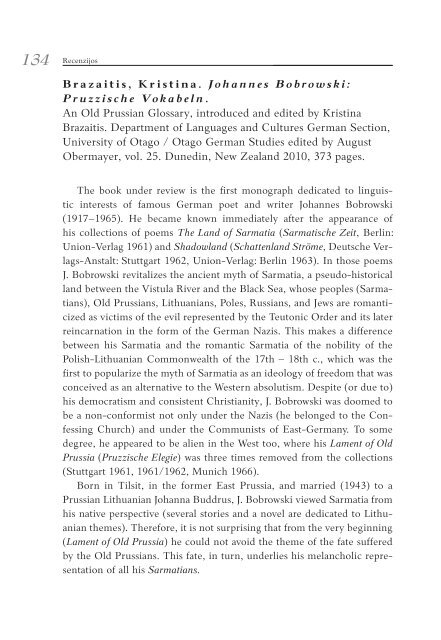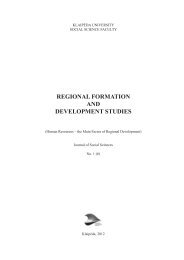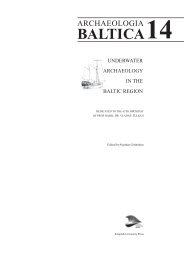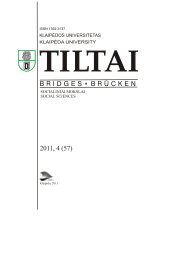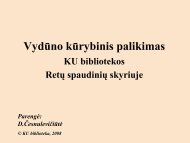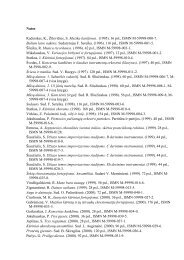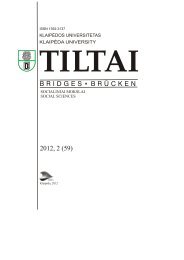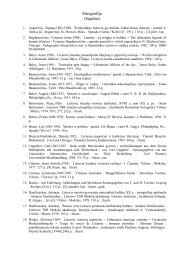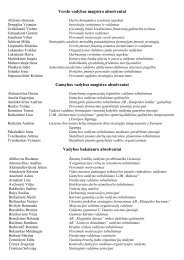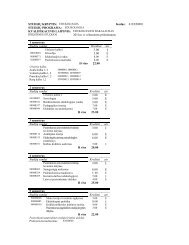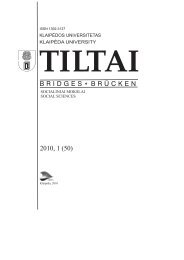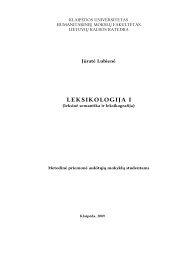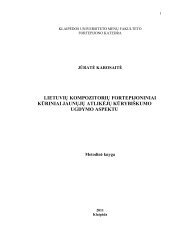visatekstis dokumentas (pdf) - KlaipÄdos universitetas
visatekstis dokumentas (pdf) - KlaipÄdos universitetas
visatekstis dokumentas (pdf) - KlaipÄdos universitetas
You also want an ePaper? Increase the reach of your titles
YUMPU automatically turns print PDFs into web optimized ePapers that Google loves.
134 Recenzijos<br />
Brazaitis, Kristina. Johannes Bobrowski:<br />
Pruzzische Vokabeln.<br />
An Old Prussian Glossary, introduced and edited by Kristina<br />
Brazaitis. Department of Languages and Cultures German Section,<br />
University of Otago / Otago German Studies edited by August<br />
Obermayer, vol. 25. Dunedin, New Zealand 2010, 373 pages.<br />
The book under review is the first monograph dedicated to linguistic<br />
interests of famous German poet and writer Johannes Bobrowski<br />
(1917–1965). He became known immediately after the appearance of<br />
his collections of poems The Land of Sarmatia (Sarmatische Zeit, Berlin:<br />
Union-Verlag 1961) and Shadowland (Schattenland Ströme, Deutsche Verlags-Anstalt:<br />
Stuttgart 1962, Union-Verlag: Berlin 1963). In those poems<br />
J. Bobrowski revitalizes the ancient myth of Sarmatia, a pseudo-historical<br />
land between the Vistula River and the Black Sea, whose peoples (Sarmatians),<br />
Old Prussians, Lithuanians, Poles, Russians, and Jews are romanticized<br />
as victims of the evil represented by the Teutonic Order and its later<br />
reincarnation in the form of the German Nazis. This makes a difference<br />
between his Sarmatia and the romantic Sarmatia of the nobility of the<br />
Polish-Lithuanian Commonwealth of the 17th – 18th c., which was the<br />
first to popularize the myth of Sarmatia as an ideology of freedom that was<br />
conceived as an alternative to the Western absolutism. Despite (or due to)<br />
his democratism and consistent Christianity, J. Bobrowski was doomed to<br />
be a non-conformist not only under the Nazis (he belonged to the Confessing<br />
Church) and under the Communists of East-Germany. To some<br />
degree, he appeared to be alien in the West too, where his Lament of Old<br />
Prussia (Pruzzische Elegie) was three times removed from the collections<br />
(Stuttgart 1961, 1961/1962, Munich 1966).<br />
Born in Tilsit, in the former East Prussia, and married (1943) to a<br />
Prussian Lithuanian Johanna Buddrus, J. Bobrowski viewed Sarmatia from<br />
his native perspective (several stories and a novel are dedicated to Lithuanian<br />
themes). Therefore, it is not surprising that from the very beginning<br />
(Lament of Old Prussia) he could not avoid the theme of the fate suffered<br />
by the Old Prussians. This fate, in turn, underlies his melancholic representation<br />
of all his Sarmatians.


